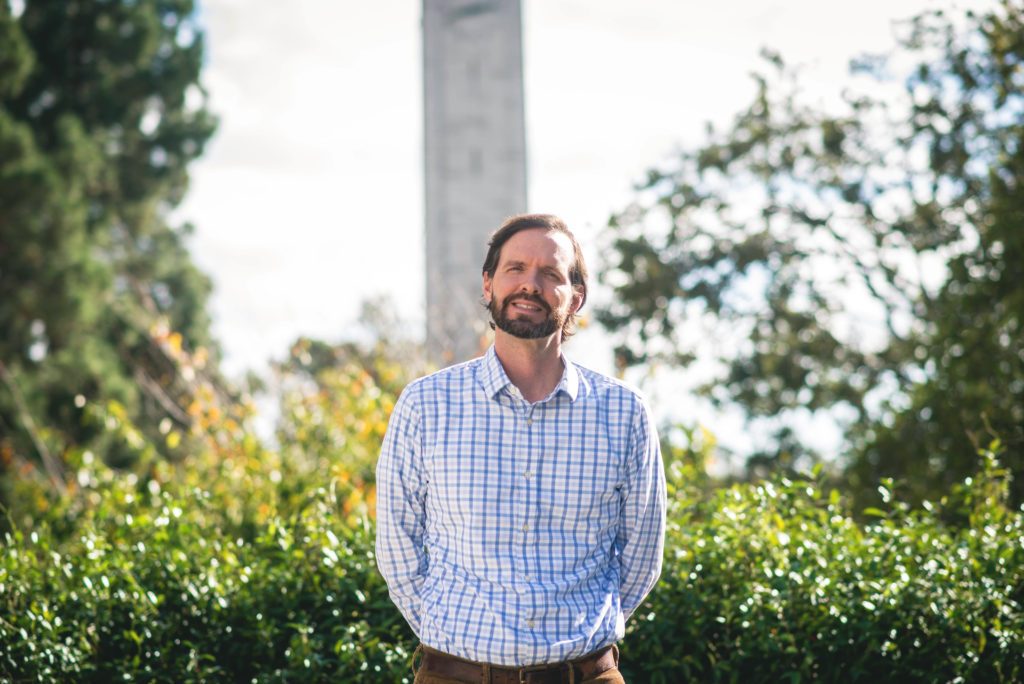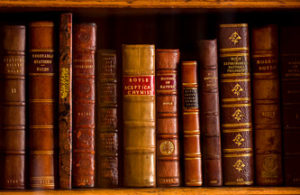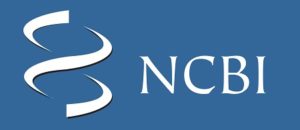Science & Engineering Libraries
Celebrating their service: Susan Edwards and Brian Quigley win 2016 Distinguished Librarian Award
The toughest crowd to impress is often the one closest to you. Colleagues share many of the same challenges — competing projects, ambitions, and timelines among them. So when Berkeley librarians join to applaud one of their own, you know it means something.
This year’s winners of the Distinguished Librarian Award are Susan Edwards, head of the Social Sciences Division, and Brian Quigley, head of the Engineering and Physical Sciences Division. “I’ve been a librarian for a long time, and am passionate about what I do,” explains Edwards. “Being honored by my peers is incredibly moving.”
The Distinguished Librarian Award is given biennially to up to two librarians recognized for their excellence by a committee of peers and faculty. The awards are administered and funded by the Librarians Association of UC Berkeley.
BRIAN QUIGLEY
In 2013, Quigley led the integration of five separate engineering and physical science (EPS) libraries into the inaugural subject division. Through the creation of this and five other divisions, over 20 subject specialty libraries have been grouped into affinity groups.
By pulling together a highly distributed workforce into larger communities, this reorganization has enhanced staff collaboration and efficiency, and has supported the streamlining and sharing of services among libraries.
A few of Quigley’s other achievements include better serving user needs by thoroughly assessing and restructuring EPS reference services, and by forming an EPS faculty library committee and a student committee to provide input on the library’s programs, outreach and acquisitions.
For Quigley, working with people is key. He derives the most satisfaction from mentoring staff, consulting with students and faculty, and collaborating with his colleagues. “When faced with difficult decisions, the staff and I often ask ‘What would Brian do?’,” explains engineering librarian Lisa Ngo.

Quigley manages the Kresge Engineering, Chemistry, Mathematics Statistics, Earth Sciences and Map, and Physics-Astronomy libraries. These serve roughly 500 faculty, 2800 graduate students, and 5000 undergraduate students in the relevant fields. Quigley is thought of as an experimenter. He frequently tries out new offerings and services based on the ideas and observations of his staff and library clients. “What we find effective is to pilot things,” he says, “and then use feedback to refine ideas and better address user needs.”
Recent pilot programs with broad student impact include joining the popular Packd app, which provides students with a real-time look at seat availability; providing an ASUC-funded REST Zone; extending the Engineering Library hours; improving student services, such as offering presentation kits for checkout, laptop lending, and more moveable whiteboards for group study; and encouraging staff in initiating their popular Maps and More series at the Earth Sciences and Map Library.
“Campus itself is such a stimulating and exciting environment,” explains Quigley. “The quality of the faculty and the caliber of the students are so inspiring. It always makes me want to be a better librarian and to serve them better.”
SUSAN EDWARDS
Susan Edwards loves the library profession because it offers “the chance to help people, together with lots of intellectual stimulation and reward.”
As division head for social sciences, she provides leadership for five libraries — Anthropology, Business, Education Psychology, Environmental Design, and Social Research. She also manages the Data Lab.
“All the social sciences disciplines are looking at how to use research to effect social change, to improve people’s lives,” explains Edwards “Information and social justice really belong together, because information is key for individuals and groups who want to change their lives.”

The most satisfying aspect of her work, she says, is working closely with students, faculty, and independent researchers. “I love helping them think through the process, and seeing their excitement when they get the information they need,” Edwards says.
After earning her M.L.I.S. at Berkeley in 1980, Edwards worked at the University Library for seven years as head of newspapers and microforms. She then went east and assumed a series of positions at the Amherst College Library.
Returning to Berkeley in 2009, Edwards was surprised at the relatively low level of entitlement among many Cal students. “It’s more about creating an environment where we’re teaching students that they can expect more support,” she explained. “Yes, they do deserve an hourlong appointment to get help with their research!”
She adds, “I love being at a public research university that’s committed to diversity and equity. We represent a pathway to mobility for many of our students, and their commitment to service inspires me. I feel lucky to be here.”
One of Edwards’ recent achievements was the process of combining three different libraries’ collections — Education, Psychology, and Social Welfare — into the Social Research Library. To help pare down and combine the materials, Edwards studied dissertation citations and noted the types of resources the three units’ students were using most. Faculty and students served by the new Social Research Library consider the transition a real success.
To build intellectual community, Edwards has launched a series of popular book talks at the library that draw faculty, students, alumni and community members. The gatherings are reinvigorating the Social Research Library as a center of learning and interaction.
“This is such an exciting time to be a librarian at Berkeley,” Edwards reflects. “Because of the far easier access to information through technology, a library’s traditional roles are now only one part of the suite of services needed. So we are rethinking the role of the library more broadly, and how it affects the life of scholarship and discovery on campus.”
Reflecting on Susan’s many contributions to the academic vitality at Berkeley, psychology professor Stephen Hinshaw noted her creativity and leadership. “Indeed, I wasn’t prepared for what a librarian in the UC system could do!”
Webcast: BD2K Open Data Science Symposium
Big Data to Knowledge
Open Data Science Symposium: How Open Data and Open Science are Transforming Biomedical Research; Details at http://event.capconcorp.com/wp/bd2k-odss/
The Open Data Science Symposium is open to the public and will be available through a webcast.
Big Data is an underutilized resource for innovation and discovery in biomedical research and the NIH is committed to unleashing its full potential by making it an open and easily accessible resource. The Open Data Science Symposium will feature discussions with the leaders in big data, open science, and biomedical research while also showcasing the finalists of the Open Data Science Prize, a worldwide competition to harness the innovative power of open data.
Please Register for the Open Data Science Symposium by November 18, 2016.
Registration is free.
Who Should Attend:
Join us for this meeting if you are interested in:
- Learning how NIH and other agencies are utilizing new models and funding approaches to support open innovation and open science
- Exploring the challenges, opportunities, and implications of a changing biomedical research landscape in which openness is the default across the globe
- Seeking to use open data in your own research and looking for inspiration from international teams who have developed award-winning prototypes
- Watching live demos of all six Open Science Prize semifinalists, and participating in the awards process through casting your vote for your favorite innovation
Event Highlights:
- Dialogue between current NIH Director, Dr. Francis Collins, and former NIH and former NCI Director, Dr. Harold Varmus, on open science at the National Institutes of Health
- Live demonstrations of six award-winning prototypes developed by international teams competing for the Open Science Prize.
- Panel discussion on new models for advancing data sharing capability through innovative infrastructure and initiatives with perspectives from leading international organizations such as ELIXIR, Wellcome Trust, and Global Alliance for Genomics and Health.
- Keynote by John Wilbanks, Chief Commons Officer at Sage Bionetworks, who has been named by Seed Magazine as one of the “revolutionary minds” and featured in Scientific American for his visionary thinking.
Acknowledgements
This symposium is funded through the NIH Big Data to Knowledge Initiative, which was launched in December 2013 as a trans-NIH program with funding from all 27 Institutes and Centers as well as the NIH Common Fund.
The Open Science Prize is made possible through a collaboration between NIH and the Wellcome Trust. The Howard Hughes Medical institute is also contributing funds for this effort.
ChemSearch Challenge 2016
The Elsevier-Reaxys ChemSearch Challenge is a chemistry search competition. A new challenge consisting of four or five questions will be posted every week for 8 consecutive weeks, and players compete on the speed with which they can submit correct answers.
Players can compete as individuals or groups, and a $200 donation will be made on behalf of each week’s winner to their choice of Doctors Without Borders, World Wildlife Fund, Natural Resources Defense Council, Partners in Health, or Oxfam International. In order to compete, an account is required.
The first challenge was posted on October 17, and subsequent challenges will be posted every Monday at 12 pm GMT.
For more information, please see:
NTRL discontinues Digital-on-Demand service
The National Technical Reports Library (NTRL) has discontinued its Digital-on-Demand service. Requests for digitization will no longer be filled after October 1, 2016.
NTRL indexes over 3 million U.S. government agency reports with more than 800,000 reports available as full-text PDFs. Questions about pending unfulfilled digitization requests can be directed to NTRLHelpDesk[at]ntis[dot]gov.
Global Engineering Academic Challenge
It’s time again for the Global Engineering Academic Challenge! Starting today, Monday, October 10th, Elsevier will post a challenge question each Monday for the next 5 Mondays (5 questions total). Complete this interdisciplinary challenge with your instructors and peers by solving problem-sets based built around 5 transdisciplinary themes including Future of Energy, Future of Making, Future of Medicine.
Each week, the winner with the highest points will receive $100 to Amazon. The first place grand prize is an Apple iPad and the second place prize is a set of Sonos speakers.
Visit the Engineering Academic Challenge to begin!
RSC Historical Collection

The Royal Society of Chemistry Historical Collection covers nearly 500 years of the development and evolution of the chemical sciences. Books, journals, letters, lecture notes, pamphlets, monographs, plus minutes and publications from learned societies are included. Some highlights of the collection:
- materials on alchemy and early chemistry dating back to the early 16th century
- materials on explosives and firearms dating back to 1598
- materials formerly in the possession of the family of Sir Humphry Davy and containing items from Antoine Lavoisier, John Dalton and Justus von Liebig, among others
- backfiles of the journal Education in Chemistry
To access the RSC Historical Collection, go to Historical books and papers or Society publications and minutes.
Maps and More 9/16/16: Introducing the Digital Globe
Please join us for the first Maps and More of the semester:
Introducing the Digital Globe
When: Friday, 9/16/16
Time: 11 am – 12 pm
Where: Earth Sciences & Map Library, 50 McCone Hall
The Library attempts to offer programs in accessible, barrier-free settings. If you think you may require disability-related accommodations, please contact the event sponsor prior to the event. The event sponsor is Sam Tepliztky.
Publish in RSC journals for free

The UC Berkeley Library is partnering with the Royal Society of Chemistry to support free Open Access publishing under the RSC’s Gold for Gold initiative.
But you must act soon: the Gold for Gold program will only continue until March 2017.
The program offers voucher codes that enable Berkeley researchers to publish their papers in Royal Society of Chemistry journals free of charge, as Gold Open Access (OA) articles, without paying the normal article publication fee (between £1000 and £2500).
You are eligible if:
- You are a UC Berkeley affiliate (faculty, staff, or student)
- Your article is new and has been accepted for publication by RSC (i.e., vouchers cannot be used for articles that have already been published) and
- You have not previously received a Gold for Gold voucher from the UC Berkeley Library in 2016
The application form is available at http://goo.gl/GAUwr, and as noted above, vouchers must be used by March 2017.
Questions? Please contact Elliott Smith, Interim Chemistry Librarian, at esmith [at] library.berkeley.edu
NCBI bioinformatics tools: An introduction

A hands-on workshop introducing NCBI bioinformatics tools such as PubMed, Gene, Protein, Nucleotide, and BLAST:
- Starting with a disease, syndrome, or process, identify the genes/proteins involved
- Starting with an organism and a protein, find the protein sequence and gene coding region
- Starting with a sequence, identify the gene/protein and source
The workshop will cover selecting the proper tools for your question, navigating through the interlinked NCBI databases, and saving your results.
- Date: Wednesday, Sept. 7
- Time: 12 – 1 pm
- Location: Bioscience Library Training Room, 2189 VLSB (inside the library)
Open to all interested students and researchers; no registration is required.
Questions? Contact esmith@library.berkeley.edu
New Student Tech Support Desk in Moffitt Library
As part of a project called Student Computing @ Cal, that was funded over the summer by the Student Technology Fund, a new technology help desk launched on Monday, August 22 today in Moffitt Library.
Undergraduate and graduate students can stop by and get help with their own laptops, phones, tablets or other personal devices.
Help includes, but is not limited to:
- Setting up your AirBears2 key
- Downloading Cal provided software, such as the Adobe Creative Suite
- Removing viruses
The technology help desk is located on the back side of the ID check desk inside the main 3rd floor entry.
Hours are posted at: https://rescomp.berkeley.edu/units/moffitt/
Students can call or email for help when the desk isn’t staffed (or any time):
- The phone number for student tech help is 510-642-5347
- The email address for student tech help is helpdesk@rescomp.berkeley.edu